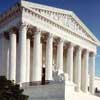
Judicial Branch & Supreme Court
Discussion and Essay Questions
Available to teachers only as part of the Teaching the Judicial Branch & Supreme CourtTeacher Pass
Teaching the Judicial Branch & Supreme Court Teacher Pass includes:
- Assignments & Activities
- Reading Quizzes
- Current Events & Pop Culture articles
- Discussion & Essay Questions
- Challenges & Opportunities
- Related Readings in Literature & History
Sample of Discussion and Essay Questions
- Why is a judicial branch so essential to a government?
- Why, according to Hamilton, are laws “a dead letter without courts to expound and define their true meaning and operation”?
- Can you think of any situation in which granting the states sole power to interpret federal laws would have been disastrous?
- What if Southern states had been free to interpret for themselves the terms of the 1964 Civil Rights Act?
- What if every state had the power to interpret federal tax laws?
- What’s the bottom line: why did the framers of the Articles of Confederation not create a federal judiciary?
- Who appoints federal judges?
- Who must approve these appointments?
- How long do judges serve?
- Does this seem very democratic to you? Why or why not?
- Should so much power lie with the president and two-thirds of the Senate?
- Is there an alternative?
- Should we elect judges?
- Should the people, at least, be allowed to approve appointments?
- Should we be able to vote them off the bench?
- Why is the Senate and not the House given the authority to approve appointments?
- If judges sat for fixed terms, would the Court be more democratic? Why or why not?
- What’s the difference between original and appellate jurisdiction?
- What are the original and appellate jurisdictions of the Supreme Court?
- Why is it more important for the Court to have extensive appellate rather than original jurisdiction?
- What is the difference between a unanimous and split Court decision?
- Why do some legal scholars argue that the best decisions are unanimous?
- What does the Court hope to achieve through its rulings?